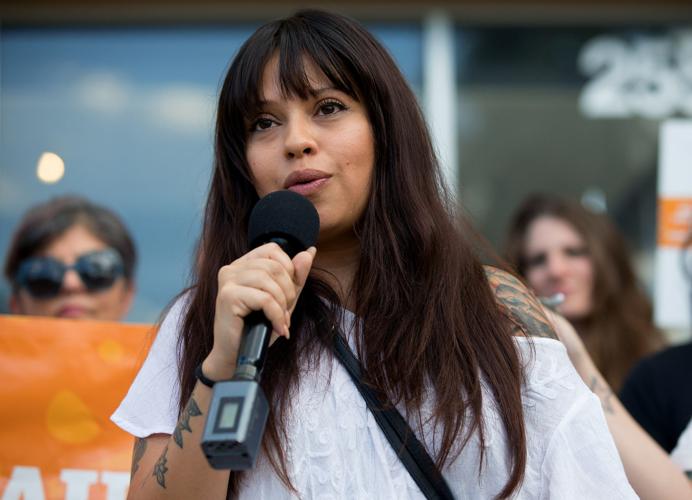The tricky thing about Tucson’s sanctuary initiative is that the people most directly affected by it won’t be voting.
The undocumented residents of Tucson, by definition, don’t have a vote, though their friends and family may.
So the initiative, which limits when Tucson police officers can inquire about people’s immigration status, will be decided largely by Tucsonans with less stake in a positive outcome — the hundreds of thousands of citizens without undocumented family members.
The risks of a yes vote, though, are borne by all.
And the political passions provoked by the word “sanctuary” mean the emotions may outrun the real-life significance of the initiative, which I suspect is relatively small.
These are challenges that organizers of the initiative drive will face as the general-election campaign begins in Tucson.
I brought up a related, basic question as I spoke with organizers of the initiative drive Friday, a question I think many Tucson voters will be asking when they decide how to vote in the coming weeks: What’s in it for me?
Billy Peard, the lawyer who drafted the initiative, and Zaira Livier, the chair of the Tucson Families Free and Together campaign, both argued that the initiative would benefit people beyond just the undocumented and their families.
The benefits of limiting when police can ask about immigration accrue to the broader community, they argued, because mixed-status families feel free to report crimes and live with less anxiety, allowing them to lead productive lives.
In addition, they noted, parts of the initiative enshrine protections for residents from racial profiling and even clarify the rules for when police stop and detain you.
“An officer shall affirmatively notify a detainee when the detainee is no longer subject to detention,” one part of the initiative says. That would apply to anyone and could clarify situations when a person is in limbo, unsure if they are detained or free to leave.
So there are a few direct and indirect benefits to those who are not undocumented or in a mixed-status family.
But most of all, the point of the initiative is to protect undocumented residents from being asked about their immigration status by Tucson police unless they are being arrested.
And the question for the rest of us is whether that’s a protection that we want to extend.
The only way to know is to consider the potential drawbacks: What will we be risking if we choose to extend this extra protection to our neighbors?
The main answer, of course, is money — in a couple of forms.
If we pass the sanctuary initiative, it will inevitably be challenged under a recent state law that gives legislators a fast-track to a semi-judicial finding.
Any state legislator can bring to the state attorney general a complaint against a local ordinance that the legislator believes violates the state constitution or law. If the attorney general finds the city is in violation, then the city has 30 days to correct the violation or have its state-shared revenue withheld by the state treasurer.
This is a big threat to a financially strapped city like Tucson.
Now, Peard worked to avoid violating state law when he was constructing the initiative. The surviving parts of Arizona’s 2010 law known as SB 1070 — the parts not struck down by the courts — require officers who develop a reasonable suspicion that a detainee is in the country illegally to determine the person’s status. So Peard simply set up structures to limit how and when officers may ask about immigration status, trying to avoid crossing that legal line.
“Our ordinance would not prohibit immigration inquiries in all detention/stop circumstances — only in certain ones,” Peard said.
Analyzing the initiative in January, city attorney Mike Rankin said he believes it does conflict with state law. So we would be trusting the judgment of Peard and eventually, of Attorney General Mark Brnovich, to believe the initiative will pass this test. Challenges to any decision could also easily bring the issue to the Arizona Supreme Court.
Then another will likely come: Rep. Bret Roberts, a Maricopa Republican, has already announced plans to strengthen state laws against sanctuary cities if Tucson passes its ordinance. The initiative we pass could contain more clearly illegal provisions if the state law becomes more restrictive later.
Another form of financial risk is that the Trump administration, so animated against sanctuary jurisdictions, will cut off grants to the Tucson Police Department or other financial aid from the Justice Department.
This one is possible — in July the administration won a ruling in the 9th U.S. Circuit Court of Appeals that allows the Justice Department to award grants in part based on local police departments’ cooperation on immigration matters. But my best guess is Tucson’s sanctuary initiative would not make us a target.
That’s because the Tucson initiative is barely “sanctuary” at all. The key factor that defines most sanctuary jurisdictions is a refusal to hand over arrestees who are in jail and are subject to a detainer from immigration authorities. This is the Pima County Sheriff’s Department’s business, not the city’s, and the sheriff is cooperating with Immigration and Customs Enforcement.
When I described Tucson’s initiative to Jessica Vaughan, a sanctuary critic who is director of policy studies for the restrictionist Center for Immigration Studies, she said it doesn’t seem to her to even qualify as “sanctuary lite.”
“The effect of this is not dramatic,” Vaughan said. “I don’t think their federal funding would be in jeopardy.”
These aren’t the only factors to consider, and we’ll be analyzing more of them as the campaign continues, but it’s important to realize this initiative is an evolution, not a revolution, in local policy.
It’s a further tightening of the immigration rule that the Police Department already has in effect, one that the department and the Tucson Police Officers Association believe is working and doesn’t need to change.
Whether that tightening, and the security it provides undocumented residents, is worth risking the wrath of a provoked state Legislature — that’s one of the main questions for Tucson voters to ponder.





